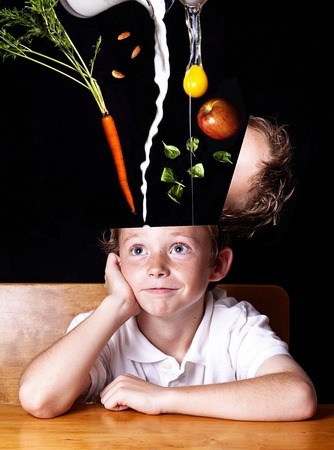Fix Your Nutrition for Better Brain Health
Abby Campbell, BSc, SFN, SSN, CPT, is a leading professional fitness and nutrition expert, researcher, and published author of "One Size Does NOT Fit All Diet Plan," one of Amazon's Top Gluten-Free and Weight Loss Diets. She is also a mother of three children - all labeled as either autistic, gifted, or creatively artistic. (You may read more about Abby at the bottom of this article.)
POLL
How often do you have brain fog or faigue?
“You are what you eat.”
You’ve probably heard this phrase dozens of times throughout your life. The notion is that a healthy diet will provide you with a fit and trim body. But, do you know that what you eat also affects your brain health?
Over the last several decades, the global food industry has impacted our eating habits profoundly. In addition to increases in heart disease and obesity, dietary changes have had a huge effect on mental well-being. It is only now that we are realizing this. Reported by the Center for Disease Control and Prevention (CDC), depression alone accounts for nearly one in 10 adults in the United States. Key findings by the National Health and Nutrition Surveys (2005-2008) also show that 11 percent of Americans over the age of 12 are on some form of antidepressant medication, while more than 60 percent have taken it for more than two years.
Depression is not the only illness that affects brain health. Anxiety, bipolar disorder, schizophrenia are just a few other disturbances. In fact, the CDC reported that about 25 percent of adults in the United States have a mental illness. Moreover, “50 percent will develop at least one mental illness during their lifetime.” Other than mental illness, many Americans are also faced with brain fog and fatigue.
If any of the following sounds like you, fixing your nutrition for better brain health will help.
- your thinking isn’t clear
- you’re unable to process information as well as you use to
- your responses to questions aren’t appropriate
- you memory is poor
- you can’t remember appointments or where you left your keys
- you’re not comprehending what others are saying
Adjusting your daily diet may not be something you considered in the past, but it is necessary to for better brain function.

Mental Health and Diet
Medical research now shows that depression and dementia are affected by our diets. In fact, studies indicate that people who eat more junk and empty calorie foods are at an increased risk for depression. While dementia has certain risk factors (i.e., high cholesterol, hypertension, type 2 diabetes, and high body fat), these factors are influenced by dietary habits. On the other hand, a diet like the Mediterranean Diet has been shown to increase cognition and protect against dementia.
While some psychiatrists may express doubt that nutrition can help at all, we must appreciate the question Dr. William Walsh brings to the table: “Where do our neurotransmitters come from?” According to his article The Critical Role of Nutrients in Mental Health published by Mental Health Consulting:
“The brain is a chemical factory that produces serotonin, dopamine, norepinephrine, and other brain chemicals 24 hours a day. The only raw materials for their syntheses are nutrients, namely, amino acids, vitamins, minerals, etc. If the brain receives improper amounts of these nutrient building blocks, we can expect serious problems with our neurotransmitters.”
While many psychiatrists believe prescription drugs are the only way to altering the mind for better health, those drugs also come with side effects. Besides, drugs only mask symptoms of a debilitating brain while benefits are achieved with sufficient nutrients found in natural foods. Side effects are also eliminated with nutrient therapy.

Healthy Proteins
|
|---|
lean red meat, pork tenderloin,
|
chicken, turkey, eggs,
|
fish, seafood,
|
Greek yogurt, cottage cheese,
|
tofu, tempeh
|
These foods are also high in B vitamins that protect your brain and your nervous system. For vegans, you may want to try tofu and tempeh.
Healthy Carbohydrates
|
|---|
Vegetables such as spinach, kale, Romaine lettuce, tomatoes, bell peppers, asparagus, broccoli, Brussels sprouts, and onions.
|
Fruits like bananas, apples, grapefruits, and berries.
|
No GMO starches such as organic oats, quinoa, and brown or wild rice
|
Tubers like potatoes and sweet potatoes.
|
The most important types of carbs include green and colorful veggies. With hundreds to choose from, find which you like and incorporate them into your diet. Include a couple of fruits per day. If you can, include berries daily as they are high in ant
Essential Fatty Acids
|
|---|
olive oil, flax oil, fish oil
|
chia seeds, flaxseeds
|
walnuts
|
cold-water fish like salmon, tuna, mackerel, herring, sardines, and anchovies
|
avocados
|
Monounsaturated and polyunsaturated fats are extremely beneficial for brain health. A type of polyunsaturated fat called Omega-3 protects your body against inflammation and disease. Omega-3 possesses anti-depressant and neuro-protective properties wh
How to Fix Your Diet
If you’ve been on a processed and refined diet for most of your life, fixing your diet for brain health may be difficult to begin. However, it is not impossible. While incorporating good eating habits, bad habits will diminish over time. It’s definitely worth it to have clarity and a sound mind. Just think of all you can do in life without a foggy and tired mind!
Following are a few tips in fixing your diet:
- Eliminate. Get rid of all processed, refined, and pre-packaged foods in your diet. They contain unnatural chemicals that contradict brain health, and they also make you fat and create disease in the body.
- Nourish. Include natural whole foods in your diet. Protein, carbohydrates, and fatty acids all play an important role for your body. Obtaining them in their natural form will provide you with essential vitamins, nutrients, and phytonutrients.
- Flush Toxins. Drink plenty of water throughout the day to eliminate toxins within the body. With less of the yucky stuff floating around, the better your body and brain health will be.
Your Brain Health
Taking measures to improve your brain health should have positive benefits for you. Good nutrition is one major component. Decreasing stress and getting enough exercise and rest per day also plays a role. If you’re still not feeling well after several weeks or months of incorporating good nutrition into your daily regimen, you may want to consult with your healthcare practitioner. Ask for diagnostic tests for vitamin deficiency and then correct them with healthy foods that contain those nutrients.
Tell Us What You Think
You're reading "Fix Your Nutrition for Better Brain Health" by Abby Campbell. Please leave a comment and tell us what you think below. Then share the article with your family and friends. You may even share on Facebook, Twitter, Google +1, or Pinterest (buttons to your right). If you're a Hubber already, you may share this hub with your own followers by clicking on the social icon for HubPages (button to your right).

About the Author
Abby Campbell, BSc, SFN, SSN, CPT, is a leading professional fitness and nutrition expert, researcher, published author, and a naturopathic doctorate candidate. For more than a decade, she has coached thousands of women locally and online to lose body fat and lead healthy lifestyles. Hundreds have also consulted with her on gluten- and lactose-free diets due to health concerns such as Celiacs, depression, and developmental disabilities. Abby is from Northern Virginia but now resides near Charlotte, North Carolina. She has been married for more than 20 years and has three grown daughters, one of which is autistic. She is a 20+ year cancer survivor.








